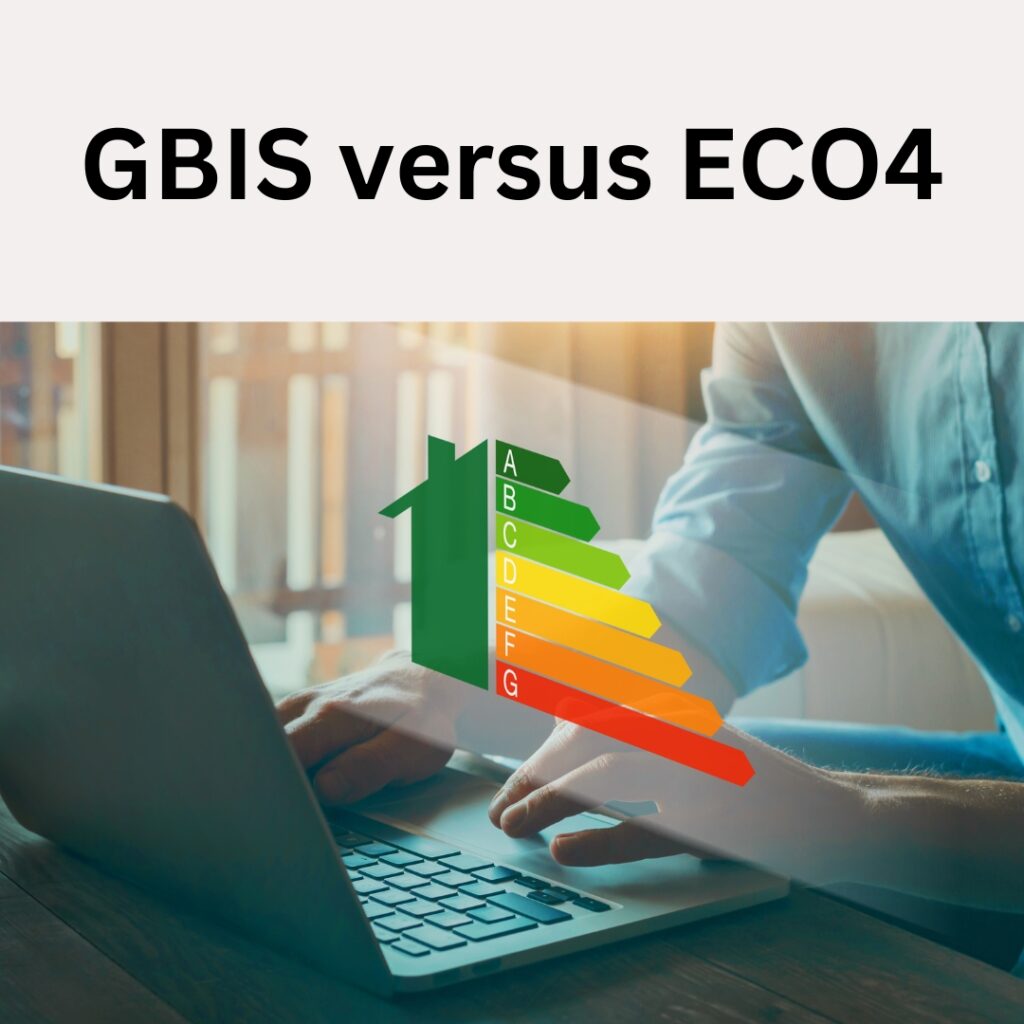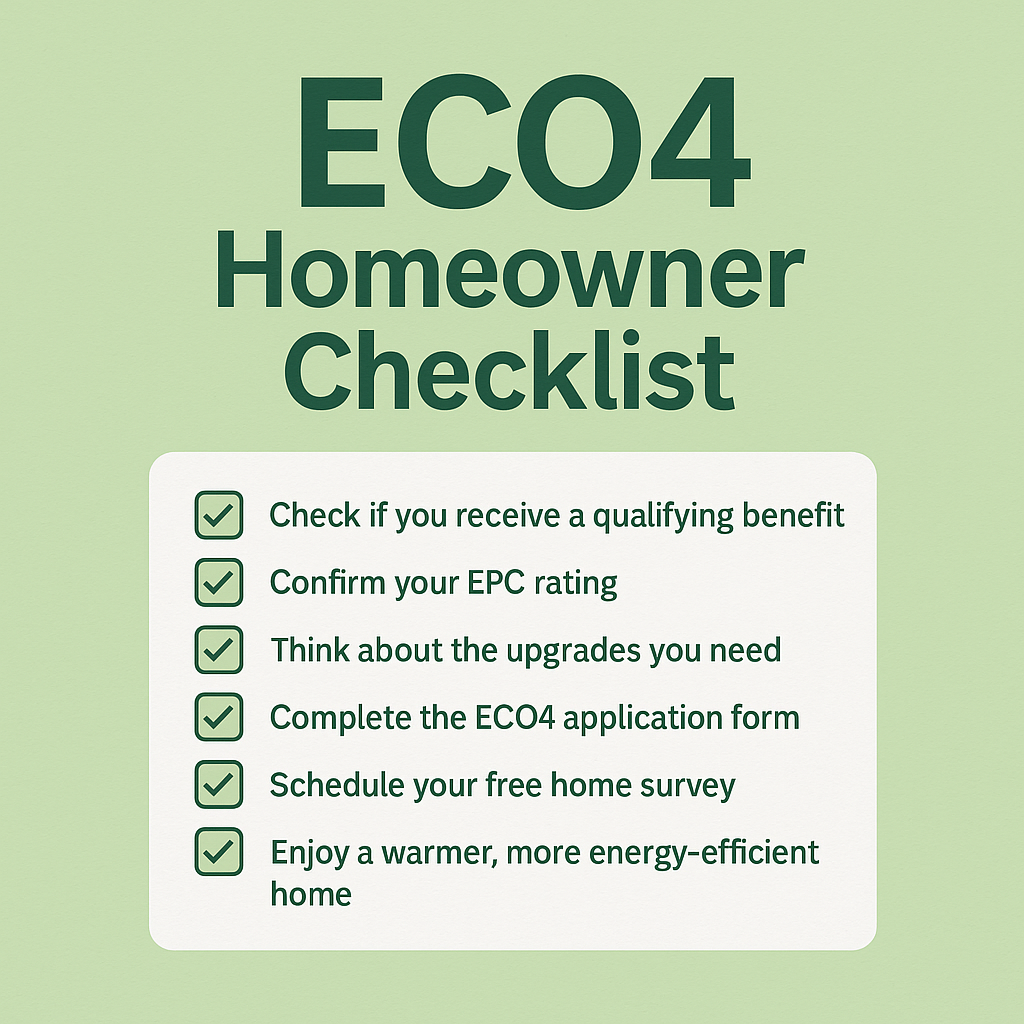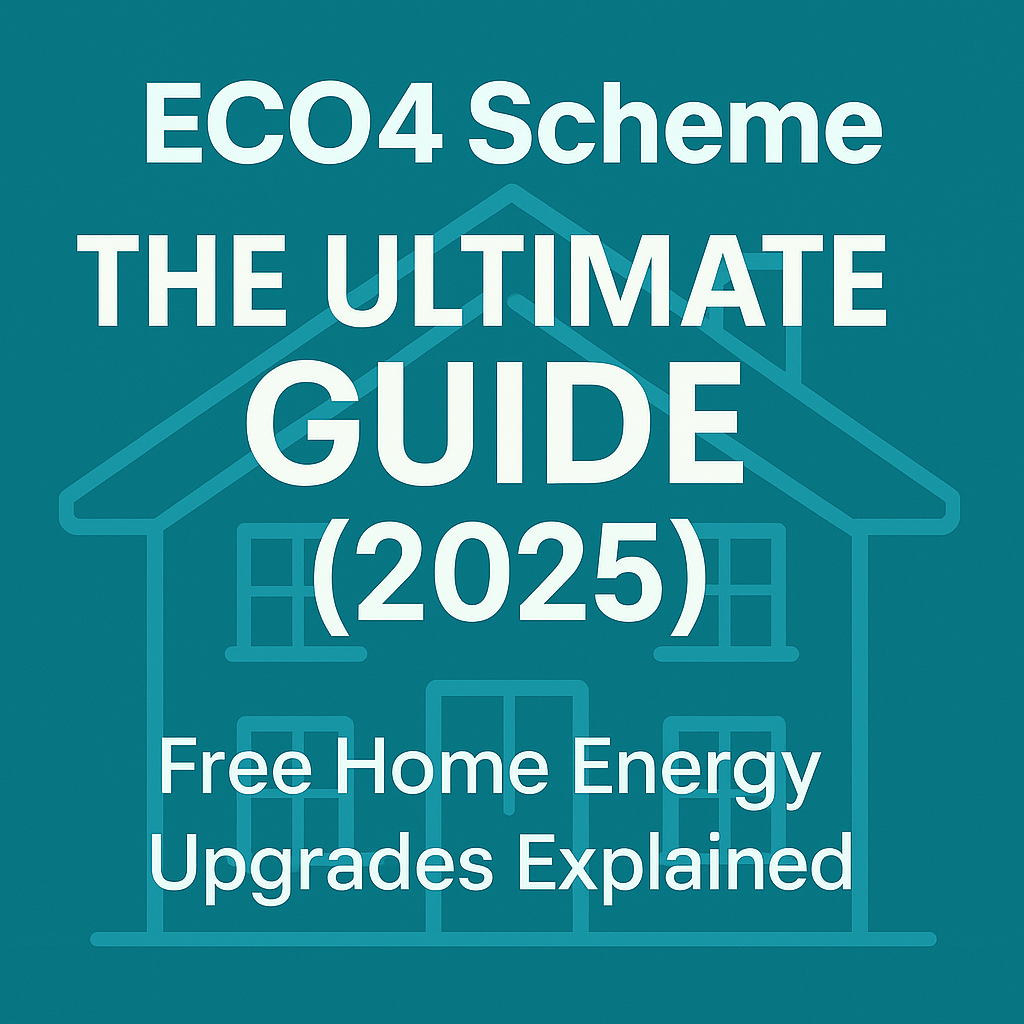Choosing between the Great British Insulation Scheme (GBIS) and the Energy Company Obligation (ECO4) can be challenging for homeowners looking to improve their energy efficiency. The main distinction is that GBIS focuses on single insulation measures, while ECO4 offers a ‘whole house’ approach. This means GBIS might be more suitable for those needing specific insulation upgrades, whereas ECO4 is ideal for comprehensive energy efficiency improvements. For those in off-gas properties, additional support might be available through specific grants, you can learn about the off gas property grant here.

Quick Overview
| Aspect | GBIS | ECO4 |
|---|---|---|
| Purpose | Focused on home insulation | Broader range of energy efficiency measures |
| Eligibility | Wider range of households (EPC D-G) | Primarily low-income households and those on benefits |
| Measures covered | Mainly insulation (cavity wall, loft, solid wall) | Insulation, heating systems, renewable technologies, and more |
| Funding source | Government-funded | Government-funded |
| Application process | Direct application or through approved installers | Through energy suppliers or their partners |
| Duration | Launched 2023, set for 3 years | April 2022 to March 2026 |
| Geographic coverage | England, Scotland, and Wales | All of UK, including Northern Ireland |
Both schemes aim to reduce fuel poverty and lower energy bills, but they cater to different groups. GBIS supports low-income and vulnerable households as well as those in specific Energy Performance Certificate (EPC) ratings and Council Tax bands, whereas ECO4 also targets similar demographics but with a more extensive approach. Understanding these differences will help us make an informed decision about which scheme best suits our needs. For those considering these schemes, it’s crucial to understand the specific energy efficiency measures offered and the impact on our energy consumption and bills. This includes looking at the potential funding and grants available, and how these government initiatives align with our goals for a more energy-efficient home.
For those considering these schemes, it’s crucial to understand the specific energy efficiency measures offered and the impact on our energy consumption and bills. This includes looking at the potential funding and grants available, and how these government initiatives align with our goals for a more energy-efficient home.
Key Takeaways
- Off-gas property grants are government grants designed to help low-income households make energy-efficient improvements to their homes.
- Understanding Off-Gas Properties is essential to know the eligibility criteria for these grants. For more details on grants available for off-gas properties, click off-gas property grants
- Homeowners can apply for different types of off-gas property grants to install energy-efficient measures, reduce their energy bills, and carbon footprint.
Understanding Off-Gas Properties
Off-gas properties are homes that are not connected to the gas grid and rely on alternative fuels such as oil, LPG, or electricity for heating and cooking. These properties are typically found in rural areas where it is not cost-effective to extend the gas network.
Characteristics of Off-Gas Homes
Off-gas properties can vary in size, age, and construction, but they share some common characteristics that make them different from gas-connected homes. For example, off-gas homes tend to have higher energy bills and lower energy efficiency ratings compared to gas-connected homes. This is because alternative fuels are often more expensive and less efficient than natural gas.
Another characteristic of off-gas homes is that they are more likely to have a lower energy performance certificate (EPC) rating. This is because EPCs take into account the type of heating and fuel used in a property. Off-gas homes are also more likely to have older heating systems that are less efficient and more prone to breakdowns.
Challenges with Energy Efficiency
Improving the energy efficiency of off-gas properties can be challenging due to the lack of access to the gas network and the higher cost of alternative fuels. However, there are off-gas property grants available to help homeowners make energy-efficient improvements to their homes. These grants can fund insulation, heating upgrades, or even renewable energy installations.
One challenge with energy efficiency in off-gas properties is that the most cost-effective measures may not always be the most environmentally friendly. For example, replacing an old oil boiler with a new condensing oil boiler may improve energy efficiency and reduce bills, but it still relies on a fossil fuel.
Understanding off-gas properties is essential for homeowners looking to improve the energy efficiency of their homes. Off-gas properties have different characteristics and challenges compared to gas-connected homes, and it is important to consider these when making energy-efficient improvements.
Eligibility Criteria for Grants
Criteria for Homeowners
To be eligible for off gas property grants, you must be a homeowner. If you are renting a property, you are not eligible for these grants. However, if you are a landlord, you may be able to apply for grants to improve the energy efficiency of your rental properties.
Household Income and Benefits
To qualify for off gas property grants, your household income must be below a certain level. The exact level varies depending on the grant, but generally, if you are on a low income, you may be eligible for a grant. In addition, if you receive certain benefits, such as Pension Credit or Child Tax Credit, you may also be eligible for a grant.
Property Eligibility
Not all properties are eligible for off gas property grants. Generally, the grants are aimed at improving the energy efficiency of older properties that are not well insulated. If your property was built after the 1990s, it is likely to be well insulated and therefore not eligible for a grant. In addition, if your property is already energy efficient, you may not be eligible for a grant.
To determine whether your property is eligible for a grant, you may need to have an energy assessment carried out. This will assess the energy efficiency of your property and identify any improvements that could be made.
Overall, off gas property grants are designed to help vulnerable households improve the energy efficiency of their homes. If you are a homeowner on a low income or receiving qualifying benefits, and your property is not well insulated, you may be eligible for a grant to help you make energy efficiency improvements.
Grant Application Process
Steps to Apply
Applying for an off-gas property grant involves several steps. The first step is to check whether your property is eligible for the grant. You can do this by visiting UKEM. Once you have determined your eligibility, the next step is to apply for the grant.
To apply for the grant, you will need to complete an application form and provide certain documentation. This documentation may include an Energy Performance Certificate (EPC) and a home survey. The EPC is a report that shows the energy efficiency of your property, while the home survey assesses the suitability of your property for energy-efficient measures.
Once your application has been submitted, it will be reviewed by the relevant authorities. If your application is approved, you will receive the grant money, which can be used to install energy-efficient measures in your property.
Required Documentation
To apply for an off-gas property grant, you will need to provide certain documentation. The exact documentation required may vary depending on your local council, but typically includes:
- Energy Performance Certificate (EPC): This is a report that shows the energy efficiency of your property. You will need to provide a valid EPC that is less than 10 years old.
- Home Survey: This is an assessment of your property’s suitability for energy-efficient measures. You may be required to provide a home survey report that is less than 2 years old.
- Proof of Ownership: You will need to provide proof that you own the property, such as a copy of the property deed or a mortgage statement.
- Quotes for Energy-Efficient Measures: You will need to provide quotes from approved contractors for the energy-efficient measures you plan to install.
It is important to note that the required documentation may vary depending on the specific grant you are applying for. It is recommended that you check with your local council to confirm the exact documentation requirements before submitting your application.
Overall, the grant application process for off-gas property grants can be complex, but it is a worthwhile investment in the long run. By installing energy-efficient measures in your property, you can save money on your energy bills and reduce your carbon footprint.
Types of Grants Available
As we mentioned earlier, there are several grants available for off-gas properties in the UK. In this section, we will provide an overview of the most popular grants available.
Home Upgrade Grant
The Home Upgrade Grant (HUG) is a grant provided by the UK government to help low-income households living in off-gas grid homes in England. The grant provides energy efficiency measures and low carbon heating to households living in the worst-performing homes. The grant covers the cost of the installation of insulation, low-carbon heating, and other energy-efficient measures. To be eligible for this grant, you must meet certain criteria, such as living in an off-gas grid home, having a low income, and having an energy performance certificate rating of E, F, or G.
Boiler Upgrade Scheme
The Boiler Upgrade Scheme is another grant provided by the UK government to help homeowners replace their fossil fuel heating systems with low-carbon alternatives. This grant covers up to £7,500 of the cost of replacing a fossil fuel heating system with a heat pump or biomass boiler. To be eligible for this grant, you must meet certain criteria, such as owning a home in England, having a fossil fuel heating system, and having an income below a certain level.
ECO4 Scheme
The Energy Company Obligation (ECO) is a scheme that requires energy suppliers to provide energy efficiency measures to households in the UK. The ECO4 scheme is the latest iteration of this scheme, and it provides funding for energy-efficient measures such as insulation, heating upgrades, and renewable energy installations. To be eligible for this scheme, you must meet certain criteria, such as living in a home with a low energy performance certificate rating, living in an off-gas grid home, or receiving certain benefits.
There are several grants available for off-gas properties in the UK, such as the Home Upgrade Grant, Boiler Upgrade Scheme, and ECO4 Scheme. These grants provide funding for energy-efficient measures such as insulation, low-carbon heating, and renewable energy installations. To be eligible for these grants, you must meet certain criteria, such as having a low income, owning a home in England, or living in a home with a low energy performance certificate rating.
Energy Efficiency Measures
At UKEM, we believe that improving energy efficiency in off-gas properties is crucial for reducing energy bills and carbon emissions. There are a variety of energy efficiency measures that homeowners can take advantage of to make their homes more sustainable. Below, we will discuss some of the most effective measures.
Insulation Solutions
One of the most effective ways to improve energy efficiency in off-gas properties is to insulate the home. Insulation helps to prevent heat loss in the winter and keep the home cooler in the summer. There are several types of insulation available, including loft insulation, cavity wall insulation, and solid wall insulation. Each type of insulation has its own benefits, and our team can help you determine which type is best for your home.
Low Carbon Heating Systems
Another effective way to improve energy efficiency in off-gas properties is to install a low carbon heating system. These systems use renewable energy sources, such as air source heat pumps, to provide heat for the home. Heat pumps are generally more efficient than traditional heating systems and can help reduce energy bills. However, the actual savings will vary depending on factors such as the customer’s current heating fuel, the energy efficiency of their home, and usage habits.. Our team can help you determine which type of low carbon heating system is best for your home.
Renewable Energy Installations
Renewable energy installations, such as solar panels and wind turbines, can also help to improve energy efficiency in off-gas properties. These installations generate electricity from renewable sources, which can help to reduce energy bills and carbon emissions. Our team can help you determine whether a renewable energy installation is right for your home.
In conclusion, there are many energy efficiency measures that homeowners can take advantage of to make their off-gas properties more sustainable. From insulation solutions to low carbon heating systems and renewable energy installations, our team is here to help you determine which measures are right for your home.
Financial Implications
Costs and Savings
When considering off gas property grants, it is important to understand the costs and savings associated with energy-saving measures. While there may be some upfront costs to implementing energy-efficient upgrades, the long-term savings can be significant.
For example, installing a new energy-efficient boiler or upgrading to double-glazed windows can result in reduced energy bills over time. In fact, according to the Energy Saving Trust, upgrading to an A-rated boiler can save homeowners up to £315 per year on their energy bills. Additionally, upgrading to double-glazed windows can save up to £110 per year.
It’s important to note that the exact costs and savings associated with off gas property grants will vary depending on the specific upgrades and the size of the property. However, it’s clear that investing in energy-saving measures can lead to long-term financial benefits.
Impact on Energy Bills
Off gas property grants can have a significant impact on energy bills. By implementing energy-efficient upgrades, homeowners can reduce their energy consumption and save money on their energy bills.
For example, the Home Upgrade Grant (HUG 2) provides funding to eligible homeowners to upgrade their homes to be more energy-efficient. This can include upgrading to an energy-efficient boiler or installing insulation to reduce heat loss. By implementing these upgrades, homeowners can reduce their energy consumption and save money on their energy bills.
It’s important to note that the exact impact on energy bills will vary depending on the specific upgrades and the size of the property. However, it’s clear that off gas property grants can have a positive impact on energy bills and help homeowners save money in the long run.
Support and Advice
At times, navigating the off-gas property grant application process can be challenging. Fortunately, there are a number of support and advice services available to assist you with the process. In this section, we will discuss some of the most helpful support and advice services that you can access.
Local Authority Initiatives
Many local authorities offer support and advice to homeowners who are looking to make energy-efficient upgrades to their homes. Local authorities can help you to identify the best off-gas property grants for your specific needs and provide guidance on the application process. They can also provide you with information on local contractors who are qualified to carry out the work.
Charities and Support Organisations
There are a number of charities and support organisations that can provide you with advice and support when applying for off-gas property grants. These organisations can help you to identify the most appropriate grants for your needs and provide guidance on the application process. They can also provide you with information on local contractors who are qualified to carry out the work.
Some of the most well-known charities and support organisations that provide advice and support for off-gas property grants include the Energy Saving Trust, the National Energy Foundation, and the Centre for Sustainable Energy.
In addition to these organisations, there are a number of government-supported schemes that can provide you with advice and support when applying for off-gas property grants. These schemes include the Home Energy Scotland Loan Scheme, the Green Deal, and the Energy Company Obligation.
Overall, there are a range of support and advice services available to help you navigate the off-gas property grant application process. Whether you are looking for guidance on the application process or information on local contractors, there is likely to be a support service that can help you.
Installation and Maintenance
Choosing Qualified Installers
When it comes to installing energy-efficient measures and low-carbon heating systems in off-gas properties, it is essential to choose a qualified installer who can carry out the work safely and to a high standard. We recommend using installers who are registered with a recognised body, such as the Microgeneration Certification Scheme (MCS) or the Gas Safe Register.
Before choosing an installer, it’s important to do your research and check their credentials. You can check if an installer is MCS certified on the MCS website or if they are Gas Safe registered on the Gas Safe Register website. You can also ask for references and check online reviews to get an idea of their previous work and customer satisfaction.
Post-Installation Support
Once your energy-efficient measures or low-carbon heating system has been installed, it’s important to ensure that it is properly maintained to ensure its longevity and efficiency. We recommend scheduling regular maintenance checks with your installer or energy supplier to ensure that your system is working as it should be.
Your installer or energy supplier should be able to provide you with guidance on how to maintain your system, including how often to schedule maintenance checks and what to look out for in terms of wear and tear. They may also offer a maintenance package that includes regular checks and repairs.
In conclusion, choosing a qualified installer and scheduling regular maintenance checks are essential for ensuring the safe and efficient operation of your energy-efficient measures or low-carbon heating system. By following these guidelines, you can ensure that your system is working as it should be and that you are getting the most out of your investment in energy efficiency.
Environmental Impact
Reduction of Carbon Footprint
Off-gas property grants promote sustainable practices and help reduce carbon footprints. By providing financial assistance to homeowners, the grants enable them to invest in energy-efficient measures such as biomass boilers, solar panels, and insulation. This, in turn, reduces the amount of energy required to heat homes and reduces the carbon emissions associated with energy production.
The installation of biomass boilers is particularly effective in reducing carbon emissions. These boilers burn wood pellets, which are a renewable source of fuel. The combustion of wood pellets produces carbon dioxide, but this is offset by the carbon dioxide absorbed by trees during their growth. As a result, biomass boilers are considered to be carbon-neutral.
Solar panels are another popular option for homeowners looking to reduce their carbon footprint. These panels generate electricity by converting sunlight into energy. By using solar panels, homeowners can reduce their reliance on fossil fuels and reduce their carbon emissions.
Promotion of Sustainable Practices
Off-gas property grants promote sustainable practices by encouraging homeowners to make energy-efficient changes to their homes. These changes not only reduce carbon emissions but also help to reduce energy bills, making homes more affordable for low-income families.
In addition to the installation of biomass boilers and solar panels, off-gas property grants can also be used to fund insulation. Insulation helps to prevent heat loss from homes, reducing the amount of energy required to heat them. This, in turn, reduces carbon emissions and energy bills.
Overall, off-gas property grants play a vital role in promoting sustainable practices and reducing carbon footprints. By enabling homeowners to make energy-efficient changes to their homes, we can create a more environmentally friendly future for all.
Frequently Asked Questions
What criteria must be met to qualify for a government home energy grant in the UK?
To qualify for a government home energy grant in the UK, you must meet certain criteria. These criteria vary depending on the type of grant you are applying for. However, most grants are available to homeowners and tenants who receive certain benefits, such as Universal Credit, Pension Credit, or Income Support. Additionally, some grants are only available to those who live in certain areas or who have specific types of heating systems. It’s important to check the eligibility criteria for each grant before applying.
How can homeowners in England apply for an off-gas property grant?
Homeowners in England can apply for an off-gas property grant by contacting their local authority. The grant is designed to help those living in properties that are not connected to the gas grid to improve the energy efficiency of their homes. This can include measures such as insulation, heating system upgrades, and draught-proofing. To be eligible, homeowners must meet certain income and property criteria.
What financial assistance is available in Wales for homes without mains gas?
In Wales, financial assistance is available for homes without mains gas through the Nest scheme. This scheme offers free advice and support on energy efficiency, as well as grants for home improvements such as insulation and heating upgrades. To be eligible, homeowners must meet certain income and property criteria.
Are there specific grants available for homeowners over 60 to install central heating?
Yes, there are specific grants available for homeowners over 60 to install central heating. The Warm Home Discount Scheme provides a one-off discount on electricity bills for eligible households, including those with occupants over the age of 60. Additionally, the Winter Fuel Payment is an annual payment to help older people with the cost of heating their homes during the winter months.
What is the Home Upgrade Grant and what are the eligibility requirements?
The Home Upgrade Grant is a government scheme that provides financial assistance to homeowners in England who want to improve the energy efficiency of their homes. The grant can be used to fund measures such as insulation, heating system upgrades, and draught-proofing. To be eligible, homeowners must meet certain income and property criteria.
How can private homeowners in the UK access free government grants for home improvements?
Private homeowners in the UK can access free government grants for home improvements by checking the eligibility criteria for each grant and applying through the relevant scheme. Some grants are available to all homeowners, while others are only available to those who meet certain income or property criteria. It’s important to research the available grants and check the eligibility criteria before applying.



